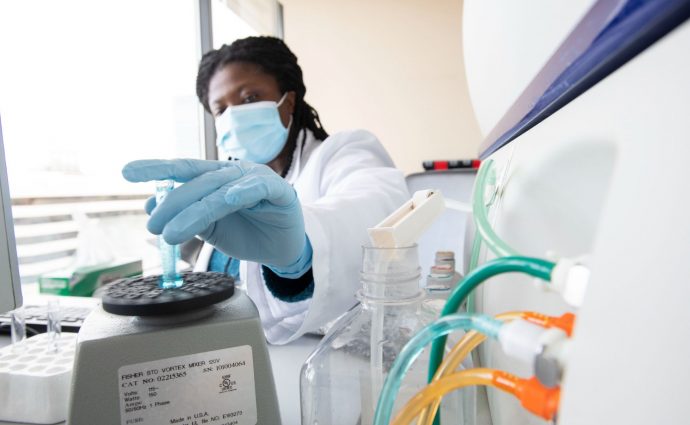In South Africa, an estimated 60% of people living with HIV also have tuberculosis (TB.) South Africa’s HIV epidemic is fueling its TB epidemic, currently ranking as the sixth-largest TB epidemic in the world. In 2019, more than 1.4 million people died of TB. The need for medical care and scientific study of both HIV and TB and HIV and TB co-infection is vital—especially during the COVID-19 pandemic, which has hit the region hard.
These hard-hit regions have a dire need for community outreach, healthcare providers’ training, and education to build anti-retroviral (ARV) adherence for long-term treatment of HIV. Additionally, building trust with Western medical practices is essential but it must be done with respect for the traditional healers the community relies on for care.
The TB in Education and Care for HIV/ AIDS (iTEACH) Program addresses these issues and works to improve HIV and TB care and treatment in the public health sector. Based at Edendale Hospital in KwaZulu-Natal, South Africa, since 2005, iTEACH works closely with Umgungundlovu District and KwaZulu-Natal Department of Health and key community stakeholders. iTEACH has helped decentralize ARV treatment, bringing treatment from a centralized hospital to community clinics within the Edendale Hospital catchment area. Because the majority of clinics do not have a doctor on staff, nurses deliver patient care. iTEACH has helped build capacity and strengthens HIV services at community clinics, preparing them to manage patients with ARVs.
iTEACH has also incorporated traditional healers in delivering TB and HIV services, extending the care and support currently provided by the Department of Health. The inclusion of traditional healers has made great strides in helping dispel suspicion and the belief that one must choose between ARV treatment and traditional culture/beliefs/practices. Combining decentralized and more accessible care, incorporating traditional healers in care delivery, and providing ongoing training and education has made a tremendous contribution in improving the conditions of South Africans suffering from HIV and TB.
In South Africa’s HIV epidemic, adolescent girls and young women account for 25% of new infections. FRESH (Females Rising through Education Support and Health) helps support this vulnerable population, combining scientific research with empowering education programs.

The immune system is incredibly complex - and artificial intelligence may be the key to understanding it. This new initiative is enabled by a generous donation from Mark and Lisa Schwartz.
South Africa’s HIV epidemic is fueling its tuberculosis (TB) epidemic. An estimated 60% of people living with HIV in South Africa also have tuberculosis (TB.) The TB in Education and Care for HIV/ AIDS (iTEACH) Program is helping improve HIV and TB care and treatment in the public health sector.